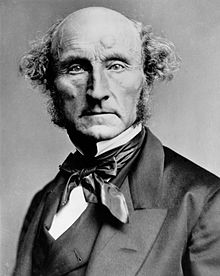
Biography
John Stuart Mill (1806–1873) was a leading figure in nineteenth-century intellectual life. He contributed to the fields of logic, economics, ethics, and social and political philosophy. Today, he is best known for his related defenses of utilitarianism and liberalism.
Mill’s rise to prominence was not an accident. Born near London, in Pentonville, England, he was the eldest son of James Mill, an intellectual and reformer closely associated with Jeremy Bentham. Bentham and Mill were the foremost members of a group called the Philosophical Radicals who were united by their commitment to Bentham’s utilitarianism as the basis for political reform. Together, the two devised a rigorous program of education designed to make young Mill a suitable heir to the utilitarian tradition. Home-schooled, he began his study of ancient Greek at three years of age, and Latin at eight. Mill was precocious, and was publishing articles defending his inherited doctrine by his early teens. At seventeen, he entered employment at the East India Company, where his father also worked. He continued working for the company for over 30 years, gradually rising to become chief examiner of correspondence. The job provided a steady income and left him sufficient time to write.
In his early twenties, Mill suffered a period of serious depression during which he came to believe that his rigorous intellectual training had left him emotionally underdeveloped. In his autobiography, Mill recounts how the poems of Wordsworth helped him recover. He also began to see the doctrine of the Philosophical Radicals more critically. He expanded his intellectual horizons, becoming interested in Romanticism and historicist strands of European thought. August Comte, Thomas Macaulay, Samuel Coleridge, and Thomas Carlyle all became significant influences. Mill became more sensitive to the importance of institutions and culture in historical development, and modified the uncompromising rationalism of early utilitarianism. He began to develop what he saw as a new form of Philosophical Radicalism that could unite the historicism and romanticism of the nineteenth century with the egalitarian rationalism of the eighteenth.
In 1830, Mill met and fell in love with Harriet Taylor, the wife of businessman John Taylor. The two carried on an intimate, apparently platonic, friendship for many years, eventually marrying two years after John Taylor’s death. Harriet was a major influence on Mill, often acting as his editor and critic. When she died in 1858, Mill was inconsolable, and spent six months of every subsequent year in France to be closer to her grave.
After retiring from the East India Company Mill stood for election and in 1865 became the Liberal MP for Westminster. He often argued that government was a trust, and that representatives should act according to their own lights rather than simply following the opinions of their constituents. During his single term in office, Mill made good on this view by adopting a number of controversial positions. His attempt to amend the Reform Act of 1867 to include suffrage for women and his support for anticolonial policies in the West Indies did not endear him to his constituents, and he failed to win a second term. Mill died in 1873 in Avignon and was buried next to his wife.